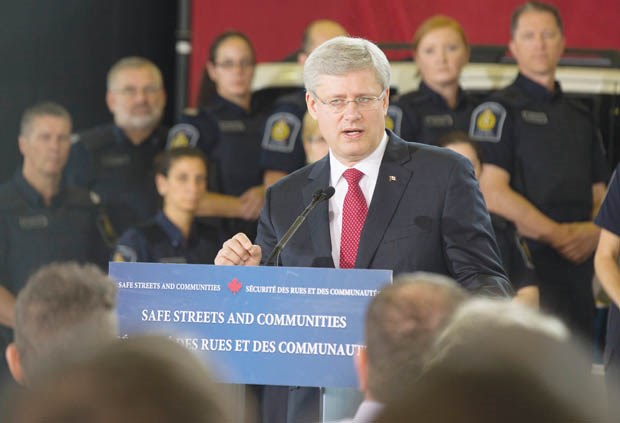The federal government acted to get even tougher on child predators at home and abroad as Prime Minister Stephen Harper unveiled plans Monday for a publicly accessible national sex offender registry and a law forcing convicted sex offenders to alert Canadian authorities before they travel internationally.
Under the Conservatives' Tougher Penalties for Child Predators Act, to be introduced in Parliament this fall, convicted sex offenders and their parole and probation officers must notify police of any international travel plans.
Police would inform Canadian border guards who would then - "where appropriate" - alert destination countries that a dangerous offender is coming their way "Gaps in information sharing between government agencies are hampering our ability to monitor and catch child predators, especially those who victimize children beyond our border," Harper said at a news conference in Richmond.
Harper cited the case of Howard Cotterman, a registered California sex offender man who was nabbed at the Mexico-U.S. border in 2007 with hundreds of images of himself molesting a young girl. He attributed Cotterman's arrest to information sharing between authorities and said, "if Cotterman were Canadian, under our current practices this might not have happened."
The legislation will also create a publicly accessible, online, national database of high-risk child predators administered by the RCMP to "replace the patchwork of registries that currently exists."
Monday's announcement was made in the same city in which notorious child-sex tourist Christopher Neil agreed to strict conditions on his freedom last October after returning from a five-year stint in a Thai prison for sexually assaulting young boys.
The former Maple Ridge English teacher, known around the world as the man with the "swirl" face in child pornography videos distributed online, was arrested last month in Vancouver for possessing a laptop. Abbotsford's Donald Bakker, 49, was the first person convicted under Canada's sex-tourism law.
He was given a 10-year sentence in 2005 after pleading guilty to two counts of sexual assault, sexual assault causing bodily harm and seven counts of invitation to sexual touching. Bakker's victims included three Vancouver women and seven girls aged seven to 12 in Cambodia.
Bakker served seven years, with credit for time served before his trial, and was released in June 2012 with strict conditions placed on his freedom.
About one-quarter of sex tourists abusing children outside of North America are American and Canadian, says ECPAT USA, part of a global organization devoted to eliminating child prostitution and trafficking. Documents released last year by Foreign Affairs show 73 Canadians were arrested between 2009 and 2011 in a foreign country for abusing or molesting children or possessing child pornography. That figure only accounts for people who requested consular assistance after they were detained.
Brian McConaghy, a former RCMP child predator investigator and founder of the charity Ratanak International, welcomed the changes announced Monday.
McConaghy, whose charity rescues and offers rehabilitation for children exploited in Cambodia, said Canadian predators all too often find their victims in countries without the resources to combat their crimes.
"There's not efficient policing, there's not social services, there's not supportive families so these predators go overseas to find the weakest link and the most vulnerable children," he said after watching Harper announce the measures.
Sun and Province "Slowly but surely we're whittling away at the brands are highly visible assets valued by the appears consistent and familiar. If you have various loopholes they can use to have freedom to move around."
The government is calling it the "most comprehensive law to combat sex crimes against children ever enacted in this country."
Harper first introduced the proposal last month. At the time, he said the bill would include new mandatory minimum and maximum sentences for child pornographers and pedophiles. It will also propose consecutive sentences for those convicted of victimizing multiple children and provisions that could compel the spouse of an accused person to testify against their partner in court.
But while Harper was thousands of kilometres away pitching tough-oncrime legislation to his base of supporters, NDP leader Tom Mulcair was in Ottawa for what was supposed to be the first day back for MPs following the summer break.
He suggested the announcement was an attempt to "distract" Canadians from the fact Harper prorogued Parliament for a month to delay having to answer tough questions on accountability, youth unemployment and rising household debt in the House of Commons.
Mulcair argued the place to debate legislation like this yet-to-be-tabled child predator bill is in Parliament and questioned why it has taken the government eight years to come up with a National Sex Offender Registry.
"If it was a real problem, we would have thought they would act on it in eight years but it's a good debate to have here in the House of Commons - only the doors are closed," he said outside the lower chamber.
For more stories, go to www.vancouversun.com



